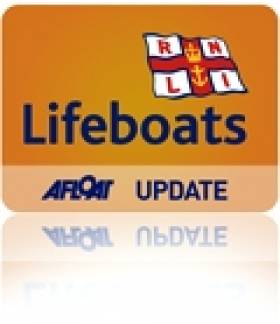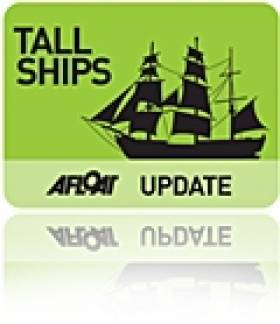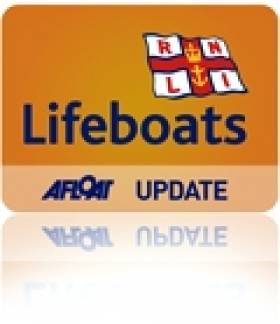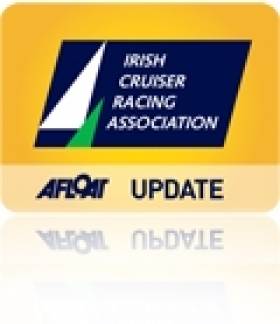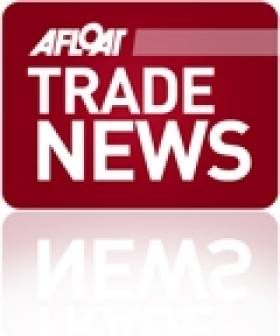Displaying items by tag: Crew
Crew wanted for 29er Worlds & Youth Worlds Campaign
After coming close to qualifying for the Youth Worlds in 2015, with only eight months in a 29er, Royal Cork youth sailor Harry Durcan is looking for a crew who wants to work towards competing at the front of the 29er fleet in European, World & Youth World Championships, with the ultimate goal being to medal at these events.
Durcan continues to train in the 29er with stand–in crews until he finds a permanent crew.
In a social media post this month, Durcan, a former top Optimist sailor, says his campaign comes complete with two competitive boats, a support Rib, training partners and a coach.
Howth RNLI Names New Treasurer at AGM
David Sargent was named as the new treasurer of Howth RNLI at the lifeboat branch's AGM and awards event recently, The Irish Times reports.
Sargent succeeds Capt Peter McKenna, who served as treasurer for the last 16 years and was awarded for his service by Howth RNLI chairman Russell Rafter.
The meeting at Howth Yacht Club saw Rafter recognise the efforts of the lifeboat's crew and fundraising volunteers - such as the Howth Sea Angling Club, who raised more than €2,000 from collection boxes last year.
Rafter awarded the organisations highest award for volunteers, the Gold Medal of the Institution, to the late former chairman Alastair McMillan, who was a committee member for 44 years.
Meanwhile, the Long Service Badge for 20 years’ service was presented to crew member Ian Massey.
Eagle Crew Get Taste for Porridge After Waterford Stop
The crew of the US Coast Guard clipper Eagle have taken home a taste for porridge oats following their visit to Waterford ahead of the Tall Ships Races.
Irish Central reports that the 140-plus crew of the training vessel took on a consignment of Flahavan's Irish Oats for their summer voyage throughout Europe and back across the Atlantic to New York on 5 August.
John Noonan of Flahavan's said the porridge oats "should certainly help keep their energy levels up as they complete the rest of their voyage. As we know, breakfast is the most important meal of the day, whether you're on land or sea."
Irish Central has more on the story HERE.
New TV Documentary: 'Smugglers'
The documentary also reveals the case of a 62-year-old retired taxi driver from Birmingham caught with 5kg of cocaine concealed behind the engine of his car.
Dramatic Photos of Clifden Lifeboat Battling Surf
John organised the training in response to the increased popularity of the area with surfers. RNLI Divisional Assessor Trainer Helena Duggan travelled to the lifeboat station to put 18 volunteer lifeboat crew through their paces and train them in handling the lifeboat in surf and responding to potential callouts from leisure marine enthusiasts.
Training is a core part of volunteering with the RNLI and each crewmember in Clifden trains once a fortnight on the stations two inshore lifeboats.
Commenting on the exercise John said, "I took my camera down to photograph the exercise and was really pleased with the results. It is great to be able to show the public what our lifeboat volunteers go through to ensure they are fit and trained to go to sea. We had a fantastic turnout on the day and the lifeboat crew learned about boat handling in surf conditions. We are delighted so many people are visiting the area for leisure marine activities."
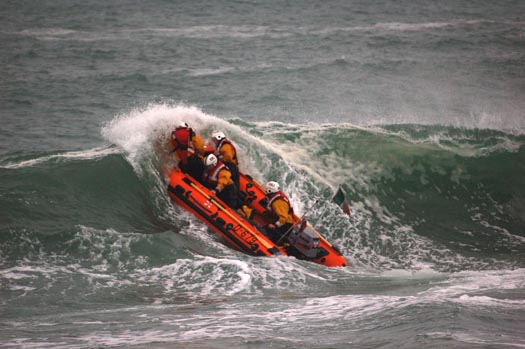
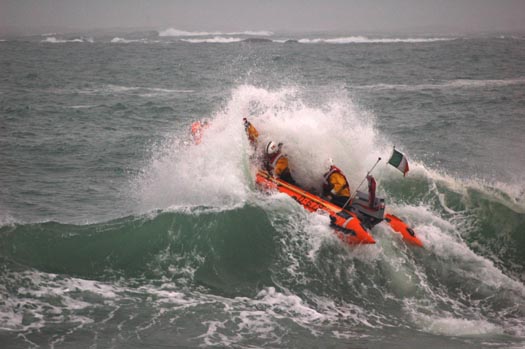
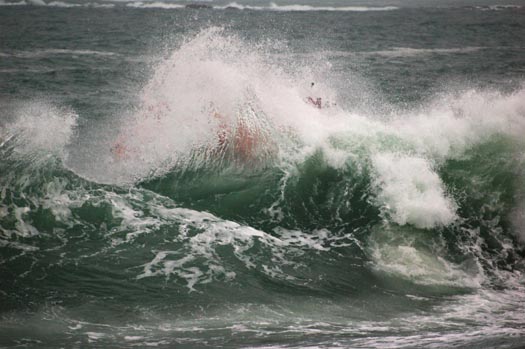
Photos by John Brittain/Clifden RNLI show Clifden volunteer lifeboat crew with RNLI Training assessor Helena Duggan during surf training on Dunloughan beach, Ballyconeely
Related Safety posts
RNLI Lifeboats in Ireland
Safety News
Rescue News from RNLI Lifeboats in Ireland
Coast Guard News from Ireland
Water Safety News from Ireland
Marine Casualty Investigation Board News
Marine Warnings
Delegates Debate IRC Rule Changes at Turkey Conference
Delegates considered 30 submissions for changes to IRC rules and processes. The most significant of these are:
- Rule 8.2.1 now requires that a boat holding a shorthanded certificate may not use her normal certificate for shorthanded races.
- New Rule 8.10 defines rated dimensions as maxima and minima and that a boat found during equipment inspection at an event to exceed any dimension is not in compliance with her certificate.
- Rule 21.8.1(c) is amended to limit the minimum size of headsail used by a boat rated for a single roller furling headsail.
- Rule 22.4 is amended by the deletion of old Rules 22.4.1, 22.4.3, 22.4.4 and 22.4.5. New Rule 22.4.2 now invokes Crew Number or alternatively maximum crew weight by default unless this is amended by a Notice of Race. Any event already including crew limitations in its Notice of Race will not need to do anything. However, any event which does not wish to enforce crew limitations will need to specifically say so in the Notice of Race. If a Notice of Race says nothing about crew, then IRC Crew Number or maximum weight will automatically apply. For further advice please go to the IRC website, www.ircrating.org.
Minutes of the IRC Congress and IRC Rules for 2011 will be posted on www.ircrating.org shortly.
Life Made Plain Sailing For Yacht Crew
Douglas, ISLE OF MAN - Moore Stephens Isle of Man, leading providers of multi-sector wealth management services has today announced a comprehensive financial support service for Superyacht crew through one of its group companies, Moore Stephens Crew Benefits Limited.
Speaking about the service line, Clive Dixon, managing director said, "While this was the logical next step in the development of the product, we actually ended up with a brand new offering powered by the International FlexiPlan retirement savings scheme. We listened to our clients who asked us to refine our existing product and the end result is a highly flexible client-focused way of managing crew benefits. Our clients wanted to be empowered to make investment decisions on the level of retirement savings they have, which is where the International FlexiPlan works perfectly."
The comprehensive service which will incorporate a 24/7 helpline comes on the back of Moore Stephens' successful Superyacht registration, HR solutions and yacht owner services which had already expanded into yacht crew payroll. It includes:
· Retirement savings plans, flexible and adaptable to a crew member's unique lifestyle, available in all major currencies.
· Health insurance, including hazardous sport, piracy and kidnapping options, but always with Med-evac as standard.
· Accident cover for dismemberment, permanent incapacity and death, among other options.
· Flexible income protection and life insurance.
"Our clients can either leave their retirement savings to be managed by their chosen provider or manage their own retirement savings using the investment funds available in the International FlexiPlan through a secure web-based platform. The International FlexiPlan has been specifically tailored with seafarers in mind. No other product on the market has been dovetailed to their needs in such a way. Our goal is to become a one-stop financial shop for crew, it's as simple as that," continued Clive.
All crew become members of "Moore Stephens Crew Club" www.mscb.im with a dedicated website and membership card which includes the telephone number of their personal 24/7 helpline.
While the International FlexiPlan retirement savings scheme was designed by Moore Stephens Isle of Man to minimise fees and charges, including fund investment fees, so that the saver gets a low cost solution to their retirement savings need, other services such as banking and insurance were arranged through strategic alliances with international banks and specialist providers with an international perspective.
Bransom Bean, Director of Moore Stephens Crew Benefits Limited, who project managed the offering, said, "We sourced specialist underwriters to provide a truly comprehensive global coverage scheme including global air Med-evac, piracy and ransom and coverage in the USA." He explained the rationale by stating, "Our brief was to design an ultra low-cost, fully flexible, international insurance product with the unique lifestyle of a yacht crew member in mind. This is a perfect fit for us as well - what could be more international than Superyachts?"


























